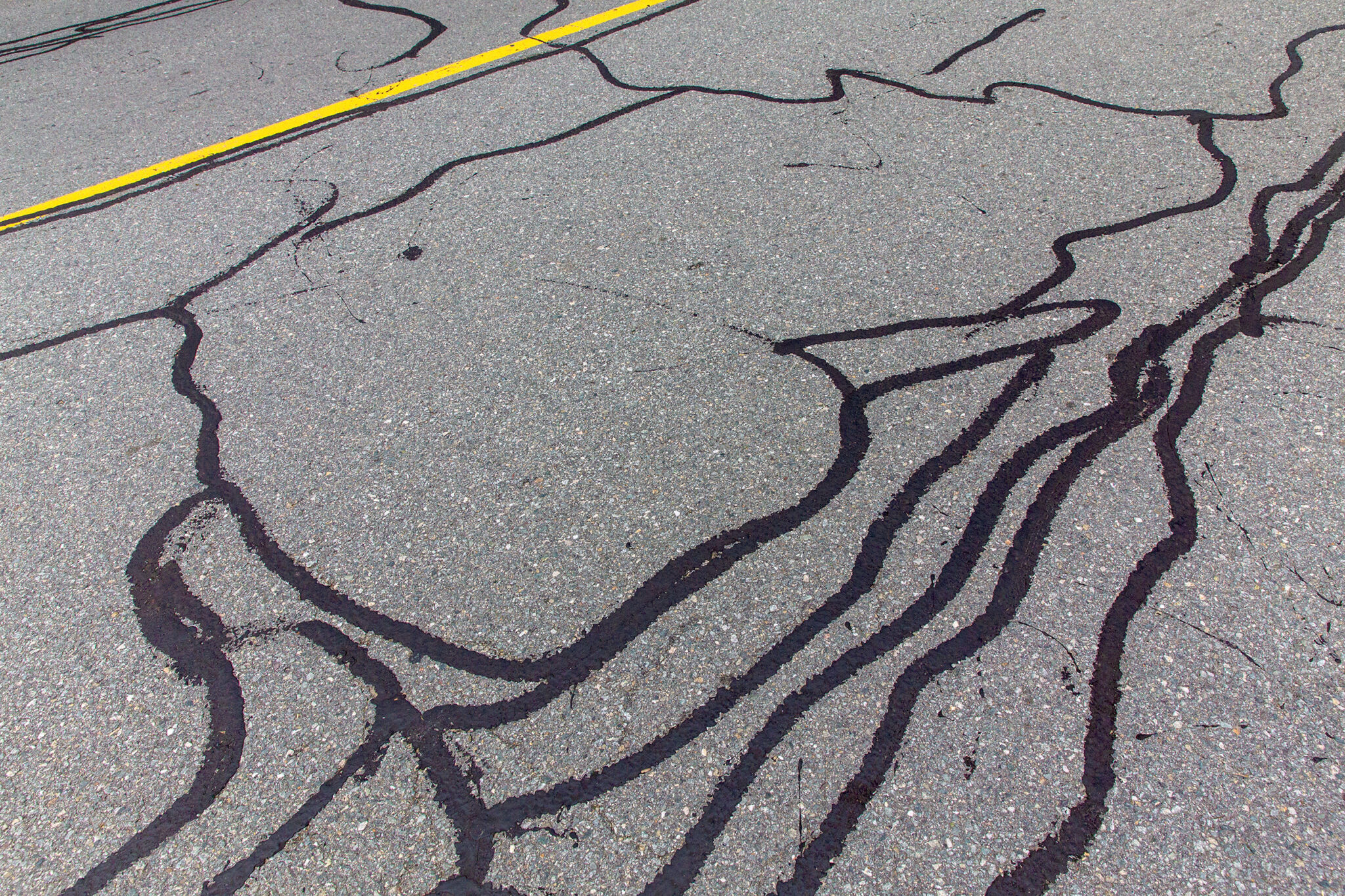If you are a property owner or manager, you know how important it is to maintain your asphalt surfaces. Crack sealing can help prevent small cracks that form on asphalt from becoming larger and more expensive problems. What exactly is crack sealing, and why is it important? This guide will provide you with all the information you need to know about asphalt crack sealing.
What is Crack Sealing?
Crack sealing is a maintenance procedure that is done on asphalt pavements to repair the surface and protect it from further damage. This process involves filling cracks and joints in the pavement with a high-quality sealant. Doing so prevents moisture, debris, and other harmful elements from entering the crevasses and worsening the damage. The main focus of crack sealing is to extend the lifespan of the asphalt by maintaining its structural integrity and preventing more severe issues that are caused by neglected cracks.
The crack-sealing process is broken down into several key steps, including cleaning the cracks, preparing them for sealing, applying the sealant, and making sure it cures properly. By addressing cracks quickly, you can avoid costly repairs and keep your pavement in excellent shape.
Why Does Asphalt Crack?
Understanding what causes cracks in the first place can help you prevent and address these unsightly formations. Here are the most common culprits of asphalt cracking:
- Weather Conditions: Asphalt is susceptible to damage from certain environmental conditions. Extremely hot temperatures cause asphalt to expand, while extremely cold temperatures cause it to contract. This constant cycle of expansion and contraction can lead to cracks. Additionally, freeze-thaw cycles exacerbate the problem. When water infiltrates cracks and freezes, it expands, widening the cracks.
- Traffic Stress: Heavy vehicle loads and frequent traffic put stress on asphalt surfaces. Over time, this stress can cause cracks to form. The asphalt is especially vulnerable if it is not properly designed to handle such loads. In addition, poorly distributed weight or excessive traffic can accelerate the cracking process.
- Poor Construction: The quality of asphalt construction plays a role in its durability. An asphalt mix that is not properly formulated or an improper installation can result in weak spots that are more prone to cracking. This includes issues with the asphalt mix’s composition or the application process.
- Subgrade Issues: The subgrade (the soil layer beneath the asphalt) affects the overall stability of the pavement. If the subgrade is not compacted properly or has moisture-related issues, it can destabilize the asphalt surface, resulting in cracks.
Asphalt surfaces are also susceptible to environmental damage from sources such as chemicals, oils, and UV rays. If you notice any spills or leaks on your pavement, it is important to clean them up ASAP to prevent damage.
Why is Crack Sealing Important?
Crack sealing helps prevent water and moisture from infiltrating the cracks and causing more damage. Here are some other reasons why crack sealing is important for maintaining the longevity of asphalt surfaces:
- Preventing Water Damage: One of the most rewarding benefits of crack sealing is its ability to prevent water seeping into cracks. Water damage can make cracks worse and cause potholes and undermining. By sealing the cracks, you keep water out and reduce the risk of these secondary issues.
- Extending Pavement Life: Regular crack sealing helps preserve the asphalt’s strength and extends its overall lifespan. By addressing minor cracks early, you can prevent them from worsening and leading to more costly repairs. A complete resurfacing may be required if the damage is too severe.
- Cost-Effective Maintenance: Proactively sealing cracks is a budget-friendly way to maintain your asphalt surfaces. The cost of crack sealing is significantly lower than the cost of repairing large-scale damage caused by neglected cracks. Timely maintenance helps you avoid more expensive repairs in the future.
- Enhancing Safety: Sealed cracks contribute to a safer driving or walking experience by reducing the risk of accidents caused by uneven surfaces or large potholes. Maintaining a smooth, crack-free surface prevents accidents and promotes safety.
While crack sealing can seem like an unnecessary expense, especially if the crack is tiny, neglecting it can lead to bigger issues that not only cost more money but also create safety hazards.
The Asphalt Crack Sealing Process
Now that you know the importance of addressing cracks on asphalt pavements, here is a detailed breakdown of the steps needed to seal them:
- Inspection and Cleaning: The first step is to inspect the asphalt surface to identify all cracks. When found, the cracks need to be cleaned of any debris, dirt, and vegetation. This can be done using a wire brush, air compressor, or vacuum. Thorough cleaning is essential as it properly prepares the crack’s surface for the following sealant.
- Crack Preparation: After cleaning, the next step is to prepare the cracks for sealing. This involves using a crack router or saw to enlarge and shape the cracks. The end goal of this step is to create a clean, uniform surface for the sealant.
- Heating the Sealant: Crack sealants are usually rubberized compounds that need to be heated to the correct temperature before application. The sealant is heated in a special machine designed for this purpose. Correctly heating the sealant helps it flow smoothly and fill the cracks effectively.
- Filling the Cracks: Once the sealant reaches the right temperature, it is poured or pumped into the prepared cracks. It is important to completely fill the cracks to ensure a durable seal. After filling, the surface is smoothed with a squeegee or trowel to ensure an even application and to remove any excess sealant.
- Cooling and Curing: After application, the sealant needs time to cool and cure. This step forms a strong bond between the asphalt and the sealant, providing long-lasting protection. The curing time can vary based on the type of sealant used and environmental conditions.
- Final Inspection: Once the sealant has cured, conduct a final inspection to check that the cracks are properly filled and the surface is smooth. Check for any missed areas or imperfections and address them as needed.
Once you notice a crack in your asphalt pavement, the best thing you can do is contact a professional to schedule repairs. Addressing cracks early on can prevent a world of headaches in the future. Contact us today for crack sealing and other asphalt repair services.
Crack Sealing Tips for Homeowners
For homeowners looking to tackle crack sealing themselves, we’ve provided some practical DIY tips:
- Regular Inspections: Inspect your asphalt surfaces regularly for cracks, especially after extreme weather conditions or heavy traffic. Cracks can come in many forms, such as longitudinal, transverse, or block cracking. Early detection allows you to deal with minor cracks before they become major problems.
- Proper Cleaning: Thoroughly clean the cracks before applying sealant. Any remaining debris or vegetation can prevent the sealant from sticking properly, leading to ineffective repairs.
- Use Quality Materials: Invest in high-quality sealants suited to your climate and asphalt type. The durability and effectiveness of the repair depend on the quality of the materials used. Cold mix asphalt patching compounds can be used for small cracks, while hot rubberized asphalt sealants are better for larger or more severe cracks.
- Follow Manufacturer Instructions: Follow the manufacturer’s instructions carefully for heating, applying, and curing the sealant. This will help you get the best results and longevity.
- Avoid Traffic Immediately: Keep traffic away from the freshly sealed area until the sealant has fully cured. Premature use can damage the sealant and compromise the repair’s effectiveness.
If you’re not comfortable repairing asphalt cracks yourself, it’s best to hire a professional. A high-quality repair is often worth the investment.
Superior Asphalt Can Help Seal Cracks on Your Property
Asphalt surfaces are a significant investment for property owners, and their durability hinges on proper maintenance. By addressing small cracks quickly, you can prevent them from evolving into larger issues. Whether you choose to tackle the sealing yourself or enlist the help of professionals like Superior Asphalt, staying proactive about asphalt maintenance will save you time, money, and stress in the long run. At Superior Asphalt, we offer a variety of asphalt repair and maintenance services, including crack sealing, to keep your pavement in top condition. Contact us today for a free quote!





